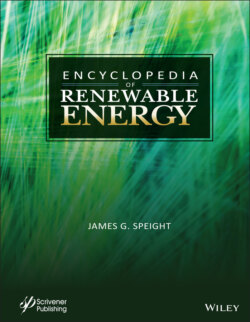Читать книгу Encyclopedia of Renewable Energy - James Speight G., James G. Speight - Страница 270
Butanol
ОглавлениеButanol (butyl alcohol) is a four-carbon alcohol that can be obtained by fermentation from the same feedstocks used in ethanol fermentation. Some properties of butanol are superior to ethanol for fuel – butanol has more energy/ gallon than ethanol, it does not absorb water easily which unlike ethanol may allow it to be transported via gasoline pipeline, and butanol-gasoline blends have lower vapor pressure than ethanol-gasoline blends which is important in reducing evaporative hydrocarbon emissions. The obvious advantages of butanol are the high octane rating (over 100) and high energy content, only approximately 10% lower than gasoline, and subsequently approximately 50% more energy-dense than ethanol, 100% more so than methanol. The major disadvantage of butanol is the high flash point (35°C, 95°F).
Traditionally, butanol is fermented from Clostridium acetobutylicum via the so- called ABE (acetone-butanol-ethanol) fermentation. ABE fermentation yields 3 parts acetone, 6 parts butanol, and 1 part ethanol (3:6:1). However, butanol from ABE fermentation is less economic than ethanol essentially because the fermentation is impeded by low concentrations of the products (end-product inhibition) requiring larger process stream volumes, reactors, and tanks.
See also: Alcohols, Ethanol, Methanol, Propanol.
